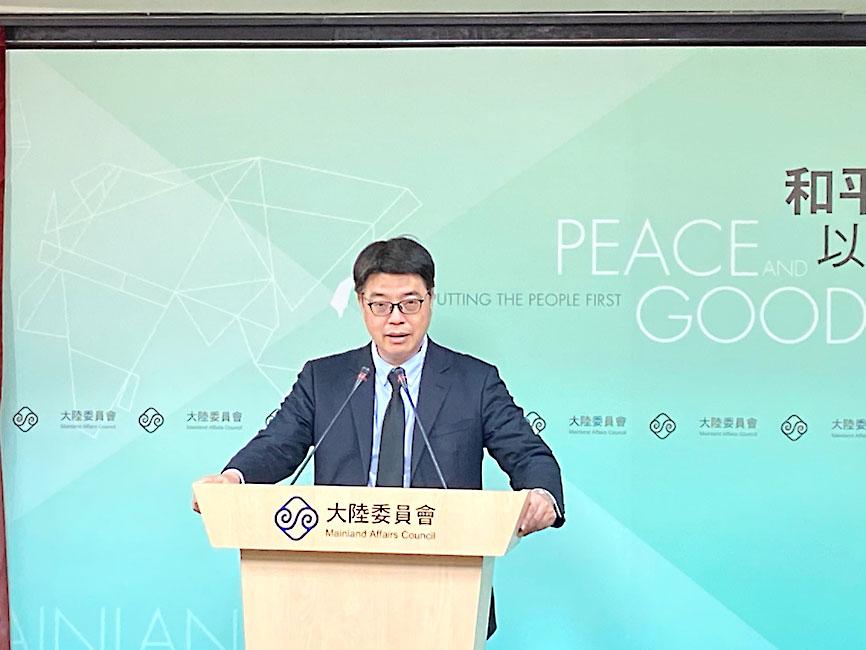China is to ban its students from applying to study in Taiwan’s schools in the semester beginning in September, citing the COVID-19 pandemic and cross-strait relations, the Chinese Ministry of Education said in a statement yesterday.
Chinese students currently enrolled in Taiwanese universities can apply to remain there, it said.
The policy regarding the admission of Taiwanese students to universities in China remains unchanged, it added.

Photo: Chung Li-hua, Taipei Times
“The pressing matters at hand include how to address the current obstacles that Chinese students [enrolled in universities in Taiwan] face in returning to the schools to study. It is important to safeguard their legitimate rights,” it said, referring to the Ministry of Education’s Feb. 3 decision to stop Chinese students from returning to Taiwanese universities after the winter break to contain the viral outbreak.
To ensure the education rights of Chinese students, the ministry offered other learning resources, such as online courses, as alternatives.
During a regular news briefing yesterday, Mainland Affairs Council spokesman Chiu Chui-cheng (邱垂正) said it regrets that China has unilaterally halted Chinese students from studying in Taiwan.
Since Taiwan’s government allowed Chinese students to study in Taiwan from 2011, it has not altered its policy of welcoming Chinese students, he said.
Nearly 8,000 Chinese students have enrolled in Taiwan’s schools, although only 800 are currently in Taiwan, he said.
Universities in Taiwan this month would normally begin accepting applications from Chinese students, and publish the results no later than July, so that they would have ample time to prepare to come to Taiwan before September, University Entrance Committee for Mainland Chinese Students secretary-general Chang Hong-de (張鴻德) said.
The committee and its Chinese counterpart were not aware of the new policy until yesterday, Chang said, adding that the announcement came abruptly.
The committee requested that its counterpart confirm details with the Chinese government, such as how the restrictions apply, so it can better respond to the situation, he said.
Last year, 3,800 Chinese students were admitted to Taiwanese universities, including 800 high-school graduates, 1,500 university graduates and 1,500 graduates from junior college programs, Chang said.
About 40 percent of the Chinese students that apply to graduate schools in Taiwan are already in Taiwan studying for a bachelor’s degree, he said.
It is still difficult to estimate how the new restrictions would affect Taiwan, he added.

Right-wing political scientist Laura Fernandez on Sunday won Costa Rica’s presidential election by a landslide, after promising to crack down on rising violence linked to the cocaine trade. Fernandez’s nearest rival, economist Alvaro Ramos, conceded defeat as results showed the ruling party far exceeding the threshold of 40 percent needed to avoid a runoff. With 94 percent of polling stations counted, the political heir of outgoing Costa Rican President Rodrigo Chaves had captured 48.3 percent of the vote compared with Ramos’ 33.4 percent, the Supreme Electoral Tribunal said. As soon as the first results were announced, members of Fernandez’s Sovereign People’s Party

MORE RESPONSIBILITY: Draftees would be expected to fight alongside professional soldiers, likely requiring the transformation of some training brigades into combat units The armed forces are to start incorporating new conscripts into combined arms brigades this year to enhance combat readiness, the Executive Yuan’s latest policy report said. The new policy would affect Taiwanese men entering the military for their compulsory service, which was extended to one year under reforms by then-president Tsai Ing-wen (蔡英文) in 2022. The conscripts would be trained to operate machine guns, uncrewed aerial vehicles, anti-tank guided missile launchers and Stinger air defense systems, the report said, adding that the basic training would be lengthened to eight weeks. After basic training, conscripts would be sorted into infantry battalions that would take

GROWING AMBITIONS: The scale and tempo of the operations show that the Strait has become the core theater for China to expand its security interests, the report said Chinese military aircraft incursions around Taiwan have surged nearly 15-fold over the past five years, according to a report released yesterday by the Democratic Progressive Party’s (DPP) Department of China Affairs. Sorties in the Taiwan Strait were previously irregular, totaling 380 in 2020, but have since evolved into routine operations, the report showed. “This demonstrates that the Taiwan Strait has become both the starting point and testing ground for Beijing’s expansionist ambitions,” it said. Driven by military expansionism, China is systematically pursuing actions aimed at altering the regional “status quo,” the department said, adding that Taiwan represents the most critical link in China’s

‘REALLY PROUD’: Nvidia would not be possible without Taiwan, Huang said, adding that TSMC would be increasing its capacity by 100 percent Nvidia Corp CEO Jensen Huang (黃仁勳) on Saturday praised and lightly cajoled his major Taiwanese suppliers to produce more to help power strong demand for artificial intelligence (AI), capping a visit to the country of his birth, where he has been mobbed by adoring fans at every step. Speaking at an impromptu press conference in the rain outside a Taipei restaurant, where he had hosted suppliers for a “trillion-dollar dinner,” named after the market capitalization of those firms attending, Huang said this would be another good year for business. “TSMC needs to work very hard this year because I need a lot